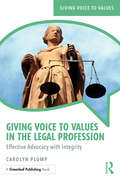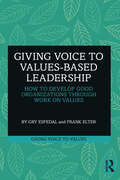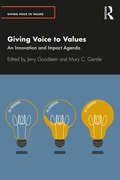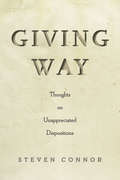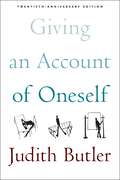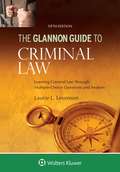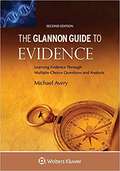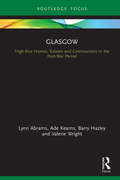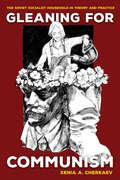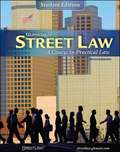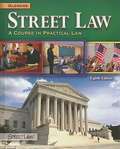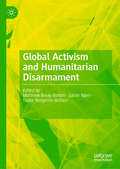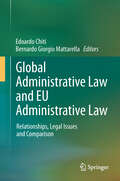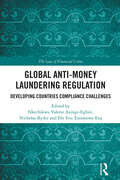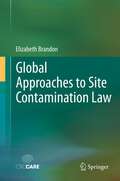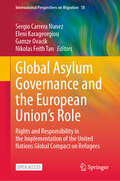- Table View
- List View
Giving Voice to Values in the Legal Profession: Effective Advocacy with Integrity (Giving Voice to Values)
by Carolyn PlumpEthical issues do not occur in isolation. Instead, real-life situations arise in the workplace alongside other pressing issues such as job security, career advancement, peer pressure, manager evaluations, and company profits. For this reason, students and employees in law need concise and common sense guidance that provides a framework for how to voice one's values in the midst of competing interests. This book does just that. By providing twelve accessible scenarios drawn from real-life examples, this book walks readers through some of the most common ethical issues they will face in the workplace and how to address them in a manner that is realistic and effective. There are two clear reasons to read Giving Voice to Values in the Legal Profession. First, it is practical. The book presents information that is readily useful to students as they move forwards in their personal lives and careers. Second, the book is concise and easy to add to an existing course. It can provide a context for discussing a myriad of issues around ethics in the legal profession.
Giving Voice to Values-based Leadership: How to Develop Good Organizations Through Work on Values (Giving Voice to Values)
by Gry Espedal Frank ElterThe complexity facing today’s organizations calls for a rethinking of leadership. The world is facing grand challenges for people and the planet. Leaders and employees bear the responsibility of formulating strategies grounded in strong values. These strategies aim to foster the growth of sustainable organizations and promote ethical work practices. This book gives voice to values-based leadership and provides a method for leaders to develop a values-based organizational culture. Values play a role on many levels in how we work as individual leaders, in teams, and in organizations and in how organizations approach societal challenges. Values can be a compass or orientation point, giving direction for decisions and actions. Awareness of values can make organizational responsibilities clearer and give a sense of meaning to work and help leaders to create organizations where corporate, moral, and social values are embedded at every level. This book gives insight into a Scandinavian values-based leadership model built on the institutional leadership tradition. It provides processes and practices that leaders can use to develop organizations where values are continuously nurtured. The book provides practical ideas of how leaders can work on becoming conscious of both the organization’s explicit and implicit values, as well as working on the direction of the organization and its broader organizational culture. This book will be an invaluable resource for both practitioners and graduate students interested in leadership and organizational development.
Giving Voice to Values: An Innovation and Impact Agenda (Giving Voice to Values)
by Jerry Goodstein; Mary C. GentileGiving Voice to Values, under the leadership of Mary Gentile, has fundamentally changed the way business ethics and values-driven leadership is taught and discussed in academic and corporate settings worldwide. This book shifts attention to the future of Giving Voice to Values (GVV) and provides thought pieces from practitioners and leading experts in business ethics and the professions on the possibilities for sustaining its growth and success. These include the creation of new teaching materials, reaching different audiences, and expanding the ways in which GVV is making a difference in classrooms and the workplace and acting as a catalyst for organizational and societal change. The book closes with a reflective chapter by Mary Gentile, looking back at where GVV has been and looking ahead to where GVV might go.
Giving Way: Thoughts on Unappreciated Dispositions
by Steven ConnorIn a world that promotes assertion, agency, and empowerment, this book challenges us to revalue a range of actions and attitudes that have come to be disregarded or dismissed as merely passive. Mercy, resignation, politeness, restraint, gratitude, abstinence, losing well, apologizing, taking care: today, such behaviors are associated with negativity or lack. But the capacity to give way is better understood as positive action, at once intricate and demanding. Moving from intra-human common courtesies, to human-animal relations, to the global civility of human-inhuman ecological awareness, the book's argument unfolds on progressively larger scales. In reminding us of the existential threat our drives pose to our own survival, Steven Connor does not merely champion a family of behaviors; he shows that we are more adept practitioners of them than we realize. At a time when it is on the wane, Giving Way offers a powerful defense of civility, the versatile human capacity to deflect aggression into sociability and to exercise power over power itself.
Giving an Account of Oneself
by Judith ButlerWhat does it mean to lead a moral life?In her first extended study of moral philosophy, Judith Butler offers a provocative outline for a new ethical practice—one responsive to the need for critical autonomy and grounded in a new sense of the human subject.Butler takes as her starting point one’s ability to answer the questions “What have I done?” and “What ought I to do?” She shows that these question can be answered only by asking a prior question, “Who is this ‘I’ who is under an obligation to give an account of itself and to act in certain ways?” Because I find that I cannot give an account of myself without accounting for the social conditions under which I emerge, ethical reflection requires a turn to social theory.In three powerfully crafted and lucidly written chapters, Butler demonstrates how difficult it is to give an account of oneself, and how this lack of self-transparency and narratibility is crucial to an ethical understanding of the human. In brilliant dialogue with Adorno, Levinas, Foucault, and other thinkers, she eloquently argues the limits, possibilities, and dangers of contemporary ethical thought.Butler offers a critique of the moral self, arguing that the transparent, rational, and continuous ethical subject is an impossible construct that seeks to deny the specificity of what it is to be human. We can know ourselves only incompletely, and only in relation to a broader social world that has always preceded us and already shaped us in ways we cannot grasp. If inevitably we are partially opaque to ourselves, how can giving an account of ourselves define the ethical act? And doesn’t an ethical system that holds us impossibly accountable for full self-knowledge and self-consistency inflict a kind of psychic violence, leading to a culture of self-beratement and cruelty? How does the turn to social theory offer us a chance to understand the specifically social character of our own unknowingness about ourselves?In this invaluable book, by recasting ethics as a project in which being ethical means becoming critical of norms under which we are asked to act, but which we can never fully choose, Butler illuminates what it means for us as “fallible creatures” to create and share an ethics of vulnerability, humility, and ethical responsiveness.
Giving an Account of Oneself: Twentieth Anniversary Edition, with a new preface by the author
by Judith ButlerWhat does it mean to lead a moral life? In their first extended study of moral philosophy, Judith Butler offers a provocative outline for a new ethical practice—one responsive to the need for critical autonomy yet grounded in the opacity of the human subject. Butler takes as their starting point one’s ability to answer the questions “What have I done?” and “What ought I to do?” They show that these questions can be answered only by asking a prior question, “Who is this ‘I’ who is under an obligation to give an account of itself and to act in certain ways?” Because I find that I cannot give an account of myself without accounting for the social conditions under which I emerge, ethical reflection requires a turn to social theory. In three powerfully crafted and lucidly written chapters, Butler demonstrates how difficult it is to give an account of oneself, and how this lack of self-transparency and narratibility is crucial to an ethical understanding of the human. In dialogue with Adorno, Levinas, Foucault, and other thinkers, they eloquently argue the limits, possibilities, and dangers of contemporary ethical thought. Butler offers a critique of the moral self, arguing that the transparent, rational, and continuous ethical subject is an impossible construct that seeks to deny the specificity of what it is to be human. We can know ourselves only incompletely, and only in relation to a broader social world that has always preceded us and already shaped us in ways we cannot grasp. If inevitably we are partially opaque to ourselves, how can giving an account of ourselves define the ethical act? And doesn’t an ethical system that holds us impossibly accountable for full self-knowledge and self-consistency inflict a kind of psychic violence, leading to a culture of self-beratement and cruelty? How does the turn to social theory offer us a chance to understand the specifically social character of our own unknowingness about ourselves? By recasting ethics as a project in which being ethical means becoming critical of norms under which we are asked to act, but which we can never fully choose, Butler illuminates what it means for us as “fallible creatures” to create and share an ethics of vulnerability, humility, and ethical responsiveness.
Glannon Guide To Criminal Law: Learning Criminal Law Through Multiple Choice Questions And Analysis (Glannon Guides Ser.)
by Laurie L. LevensonThe proven Glannon Guide is a user-friendly study aid to use throughout the semester as a great supplement to (or substitute for) classroom lecture. Topics are broken down into manageable pieces and are explained in a conversational tone. Chapters are interspersed with hypotheticals like those posed in the classroom that include analysis of answers to ensure thorough understanding. Additionally, "The Closer" questions pose sophisticated hypotheticals at the end of each chapter to present cumulative review of earlier topics. More like classroom experiences, the Glannon Guide provides you with straightforward explanations of complex legal concepts, often in a humorous style that makes the material stick.
Glannon Guide To Evidence: Learning Evidence Through Multiple-Choice Questions And Analysis
by Michael AveryLaw school classroom lectures can leave you with a lot of questions. Glannon Guides can help you better understand your classroom lecture with straightforward explanations of tough concepts with hypos that help you understand their application. The Glannon Guide is your proven partner throughout the semester when you need a supplement to (or substitute for) classroom lecture.
Glasgow: High-Rise Homes, Estates and Communities in the Post-War Period (Built Environment City Studies)
by Lynn Abrams Barry Hazley Ade Kearns Valerie WrightIn the wake of an unparalleled housing crisis at the end of the Second World War, Glasgow Corporation rehoused the tens of thousands of private tenants who were living in overcrowded and unsanitary conditions in unimproved Victorian slums. Adopting the designs, the materials and the technologies of modernity they built into the sky, developing high-rise estates on vacant sites within the city and on its periphery. This book uniquely focuses on the people's experience of this modern approach to housing, drawing on oral histories and archival materials to reflect on the long-term narrative and significance of high-rise homes in the cityscape. It positions them as places of identity formation, intimacy and well-being. With discussions on interior design and consumption, gender roles, children, the elderly, privacy, isolation, social networks and nuisance, Glasgow examines the connections between architectural design, planning decisions and housing experience to offer some timely and prescient observations on the success and failure of this very modern housing solution at a moment when high flats are simultaneously denigrated in the social housing sector while being built afresh in the private sector. Glasgow is aimed at an academic readership, including postgraduate students, scholars and researchers. It will be of interest to social, cultural and urban historians particularly interested in the United Kingdom.
Glass People
by Gail GodwinFrancesca has never worked and has never wanted to. She lives only to appreciate the finer things and to be adored. But after four years of marriage, she finds herself unable to move, to dress in the morning, or to take the elevator outside. Lately, she finds her days drifting by in a haze. She'd like to leave Cameron, but the effort seems too great. Instead, she visits her mother, once her closest confidante, now indifferent and distant. As Francesca prays for rescue, change makes a surprise appearance, and suddenly she is faced with the choice between an awkward life and a slow, comfortable death.
Gleaning for Communism: The Soviet Socialist Household in Theory and Practice
by Xenia A. CherkaevGleaning for Communism is a historical ethnography of the property regime upon which Soviet legal scholars legislated a large modern state as a household, with guaranteed rights to a commons of socialist property, rather than private possessions. Starting with former Leningrad workers' everyday stories about smuggling industrial scrap home over factory fences, Xenia Cherkaev traces collectivist ethical logic that was central to this socialist household economy, in theory and practice: from its Stalin-era inception, through Khrushchev's major foregrounding of communist ethics, to Gorbachev's perestroika, which unfurled its grounding tension between the interests of any given collective and of the socialist household economy itself. A story of how the socialist household economy functioned, how it collapsed, and how it was remembered, this book is haunted throughout by a spectral image of the totalitarian state, whose jealous political control over the economy leads it to trample over all that which ought to be private. Underlying this image, and the neoliberal state phobia it justified, is the question of how individual interests ought to relate to the public good in a large modern society, which, it is assumed, cannot possibly function by the non-private logics of householding. This book tells the story of a large modern society that did.
Glencoe Introduction to Criminal Justice
by Robert M. Bohm Keith N. HaleyPrepares Students for Careers in Protective Services!
Glencoe Street Law: A Course in Practical Law (7th edition)
by Lee P. ArbetmanGaining a practical understanding of the law and the legal system Street Law: A Course in Practical Law's interactive methods focus on legal issues relevant to your students' lives that help them develop the knowledge and skills essential to living in our law-related society.
Glencoe Street Law: A Course in Practical Law (8th edition)
by Lee P. Arbetman Edward L. O'BrienGAINING A PRACTICAL UNDERSTANDING OF THE LAW AND THE LEGAL SYSTEM. Street Law's interactive methods focus on legal issues relevant to students' lives help students develop the knowledge and skills essential in our law-related society. Features * Intellectual property coverage invites students to consider issues related to ownership of ideas. * Case Studies illustrate legal issues in the context of real-life and hypothetical situations. * Human Rights U.S.A. offers an opportunity to study human rights issues in the United States. * You Be the Judge involves students in considering and deciding the outcome of a legal situation. * Where You Live highlights variations in local law and procedures. * Youth Act helps students learn how to advocate for change in their community and how to solve problems without going to court. * Legal Documents are reproduced in the text to aid students' understanding.
Glencoe Understanding Business and Personal Law (11th edition)
by Gordon W. Brown Paul A. SukysIntroduce students to the laws that affect their daily lives. New elements in every component!
Glencoe, Business and Personal Law, Real-World Connections
by Gordon W. Brown Paul A. Sukys BusinessWeek Standard Poor'SNIMAC-sourced textbook
Glitter and Greed
by Janine RobertsThe result of 20 years research on the diamond trade and De Beers, this book reveals the myths and misinformation in the industry.
Global Activism and Humanitarian Disarmament
by Matthew Breay Bolton Sarah Njeri Taylor Benjamin-BrittonThis book analyses the politics of the humanitarian disarmament community—a loose coalition of activist and advocacy groups, humanitarian agencies and diplomats—who have successfully achieved international treaties banning landmines, cluster munitions and nuclear weapons, as well as restricting the global arms trade. Two campaigns have won Nobel Peace Prizes. Disarmament has long been a dirty word in the international relations lexicon. But the success of the humanitarian disarmament agenda shows that people often choose to prohibit or limit certain violent technologies, for reasons of security, honour, ethics or humanitarianism. This edited volume showcases interdisciplinary research by scholars and practitioners seeking to understand the dynamics and impact of the new global activism on weapons. While some raise concerns that humanitarian disarmament may be piecemeal and depoliticizing, others see opportunities to breathe new life into moribund arms control policymaking. Foreword by 1997 Nobel Peace Prize Laureate Jody Williams.
Global Administrative Law and EU Administrative Law
by Edoardo Chiti Bernardo Giorgio MattarellaThis book seeks to enrich and refine global administrative law and EU administrative law analytical tools by examining their manifold relations. Its aim is to begin to explore the complex reality of the interactions between EU administrative law and global administrative law, to provide a preliminary map of such legal and institutional reality, and to review it. The book is the first attempt to analyze a dense area of new legal issues. The first part of the book contains core elements of a general theory of the relationships between global and EU administrative law: comparative inquiries, exchanges of legal principles, and developing linkages. The second part is devoted to special regulatory regimes, in which global and European law coexist, though not always peacefully. Several sectors are considered: cultural heritage, medicines, climate change, antitrust, accounting and auditing, banking supervision, and public procurement.
Global Aeronautical Distress and Safety Systems (GADSS): Theory and Applications
by Stojče Dimov IlčevThis book presents the principal structure, networks and applications of the Global Aeronautical Distress and Safety System (GADSS) for enhanced airborne Communication, Navigation and Surveillance (CNS). It shows how their implementation works to ensure better security in flight and on the airports surface; improved aircraft tracking and determination in real space and time; and enhanced distress alerting, safety; and Search and Rescue (SAR) system for missing, hijacked and landed aircraft at sea or on the ground. Main topics of this book are as follows: an overview of radio and satellite systems with retrospective to aeronautical safety; security and distress systems; space segment with all aspects regarding satellite orbits and infrastructures; transmission segment of radio and satellite systems; ground segment of radio and earth ground stations; airborne radio and satellite antenna systems and propagation; aeronautical VHF and HF Radio CNS systems and networks; Inmarsat, Iridium and Cospas-Sasrast aeronautical satellite CNS systems and networks; Aeronautical Global Satellite Augmentation System (GSAS) and networks; Digital Video Broadcasting - Return Channel via Satellite (DVB-RCS) standards and Aeronautical Stratospheric Platform Systems (SPS) and networks.
Global Animal Law from the Margins: International Trade in Animals and their Bodies (Law, Justice and Ecology)
by Iyan OfforThis book critically engages the emerging field of global animal law from the perspective of an intersectional ethical framework. Reconceptualising global animal law, this book argues that global animal law overrepresents views from the west as it does not sufficiently engage views from the Global South, as well as from Indigenous and other marginalised communities. Tracing this imbalance to the early development of animal law’s reaction to issues of international trade, the book elicits the anthropocentrism and colonialism that underpin this bias. In response, the book outlines a new, intersectional, second wave of animal ethics. Incorporating marginalised viewpoints, it elevates the field beyond the dominant concern with animal welfare and rights. And, drawing on aspects of decolonial thought, earth jurisprudence, intersectionality theory and posthumanism, it offers a fundamental rethinking of the very basis of global animal law. The book's critical, yet practical, new approach to global animal law will appeal to animal law and environmental law experts, legal theorists, and those working in the areas of animal studies and ecology.
Global Anti-Money Laundering Regulation: Developing Countries Compliance Challenges (The Law of Financial Crime)
by Nicholas Ryder Nkechikwu Valerie Azinge-Egbiri Ehi Eric Esoimeme EsqThis book explores the politics of money laundering and terrorist financing (ML/TF) regulation in several countries across Africa and the Small Island States. Developed countries created the Financial Action Task Force (FATF) to combat ML/TF globally. Expectedly, the FATF’s standards mirror existing banking regulations within the G7 countries. Yet, the standards apply to all countries irrespective of the limited ML/TF risks they pose to the global economy, their weak pre-conditions for effective regulation and their non-involvement in the FATF’s framing. Still, such countries, mainly within the Global South, have worked hard to amplify their compliance with the regime due to fears of the repercussions of their non-compliance. This collection demonstrates how the global ML/TF regulation is treated as an implicitly superior legal regime where the Global South must comply irrespective of their perception of the FATF’s legitimacy challenges. It shows that beyond exogenous factors such as neo-colonialism, endogenous factors such as weak institutions and corruption undermine the compliance trajectory of the Global South. Furthermore, it analyses the unintended consequences of transplanting FATF standards into diverse legal and cultural contexts. The volume contributes to our understanding of the challenges of transplantation from the Global North and how the Global South is steering within the constraints created by the FATF. It advocates for a comprehensive understanding of the nuanced compliance challenges of developing countries. It further proposes practical solutions to address them, emphasizing the importance of risk-based understanding, accountability, capacity-building and coordination in achieving effective anti-money laundering and counter-terrorist financing measures. The collection will be essential reading for researchers, academics and policy-makers working in financial crime regulation and international economic law.
Global Anti-Terrorism Law and Policy
by Victor V. Ramraj Kent Roach Michael Hor George WilliamsPreventing acts of terrorism remains one of the major tasks of domestic governments and regional and international organisations. Terrorism transcends borders, so anti-terrorism law must cross the boundaries of domestic, regional and international law. It also crosses traditional disciplinary boundaries between administrative, constitutional, criminal, financial, immigration, international and military law, as well as the law of war. This second edition provides a comprehensive resource on how domestic, regional and international responses to terrorism have developed since 2001. Chapters that focus on a particular country or region in the Americas, Europe, Africa and Asia are complemented by overarching thematic chapters that take a comparative approach to particular aspects of anti-terrorism law and policy.
Global Approaches to Site Contamination Law
by Elizabeth BrandonThe book describes the complex and variable laws addressing site contamination, reviewing existing international, regional and national law of relevance to site contamination. It also offers detailed case studies of national approaches to the issue, and goes on to explore avenues for promoting the development of comprehensive domestic laws on site contamination, with a focus on the role of international law and actors. A detailed discussion analyzes such variations as a binding international legal instrument, a non-binding instrument, and a model framework for site contamination management. The text includes recommendations regarding the key elements needed for regulating site contamination at the national level. The author also offers an appropriate and feasible timetable for international action to promote better national law and policy regarding contaminated sites.
Global Asylum Governance and the European Union's Role: Rights and Responsibility in the Implementation of the United Nations Global Compact on Refugees (International Perspectives on Migration #18)
by Eleni Karageorgiou Sergio Carrera Nunez Gamze Ovacik Nikolas Feith TanThis open access book provides a state-of-the-field of the interactions between emerging national asylum governance systems and the 2018 United Nations Global Compact for Refugees (UN GCR). It provides a detailed examination of the relationship and compatibility between asylum governance and refugee protection and human rights, and the responsibilities for states and other implementing actors in cases of human rights violations. This book analyses the characteristics and impacts of existing and emerging asylum governance instruments and their practical implementation in selected countries hosting large communities of refugees around the world. Particular focus is given to the cases of Bangladesh, Brazil, Canada, Jordan, Niger, Serbia, South Africa and Turkey. Attention is put into regional and country-specific asylum instruments and actors from the perspective of their effectiveness, fairness and consistency with refugee protection and human rights standards as well as the UN GCR commitments. By doing so, the book identifies key lessons learned and offers a critical view on policies framed as `promising practices' so as to inform future steps in the UN GCR implementation and asylum governance more generally. As such, the book provides a better understanding of the concept of “mobility” in asylum governance, and the ways in which it is articulated into legal and policy instruments framed as "protection" and - in the language of the UN GCR - “third country solutions” for refugee mobility, including resettlement, private/community sponsorships, humanitarian corridors, in the European Union and around the world.
